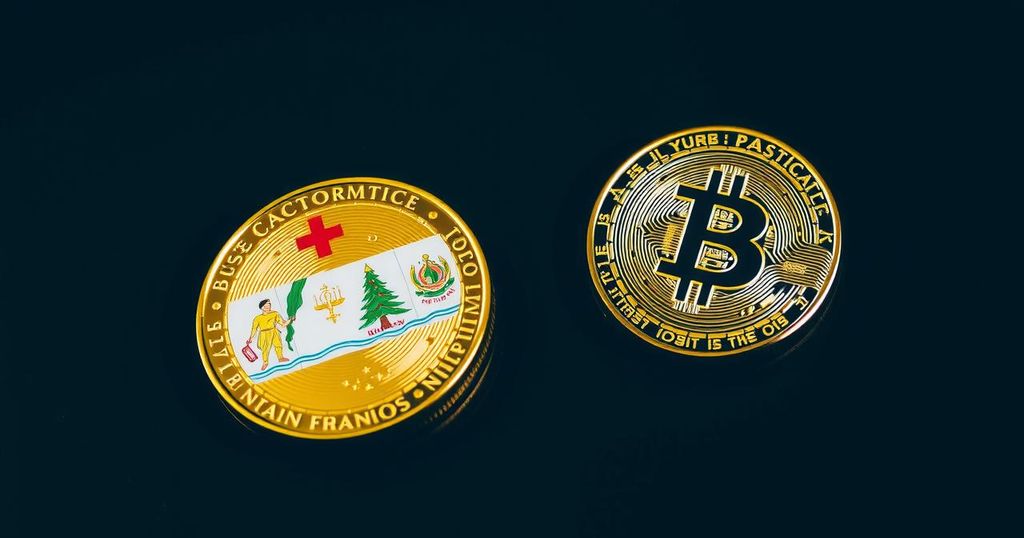Bhutan and El Salvador Lead Bitcoin Adoption While Germany Misses Opportunities

Bhutan and El Salvador have successfully leveraged Bitcoin, resulting in substantial financial gains for both nations. Bhutan’s mining operations have created over $1 billion in assets, while El Salvador has seen a significant appreciation of its Bitcoin holdings since adopting it as legal tender. In contrast, Germany’s recent Bitcoin liquidation reflects a missed opportunity worth $1.7 billion, highlighting the risks associated with managing crypto assets.
Bhutan and El Salvador have emerged as successful pioneers in the adoption of Bitcoin, particularly through sovereign wealth management strategies that have yielded significant financial returns. In Bhutan, strategic decisions made in 2019 to engage in Bitcoin mining have resulted in their holdings surpassing $1 billion, a considerable enhancement to the country’s sovereign portfolio. Conversely, Germany’s recent divestiture of 50,000 Bitcoin during a market downturn reflects a missed opportunity valued at approximately $1.7 billion due to post-sale price surges. El Salvador, under the leadership of President Nayib Bukele, has made history as the first nation to officially recognize Bitcoin as legal tender. The nation holds around 5,900 Bitcoin, which has appreciated by over $100 million within a week. The strategic steady accumulation commenced with an initial onboarding of only 200 Bitcoin, contrasting sharply with Germany’s large-scale selloff of seized assets. This divergence illustrates different perspectives on Bitcoin’s long-term potential within national economies. The contrasting strategies adopted by these nations underscore the growing recognition of Bitcoin’s capacity to serve as a valuable component of sovereign reserves. Bhutan’s ongoing acquisition of Bitcoin, managed through its commercial entity Druk Holding and Investments, showcases a proactive approach to engaging with this volatile yet lucrative asset class. In late October, Bhutan transferred $66 million worth of Bitcoin to exchanges, taking advantage of the climbing prices, which highlights their commitment to active asset management. Germany’s earlier decision to liquidate Bitcoin holdings during a downturn ultimately serves as a cautionary tale about the nature of volatility within cryptocurrency markets. Experts predict that this could herald a new era in sovereign wealth management where digital assets play an increasingly substantive role, prompting analysts to recommend other nations emulate the successful strategies of Bhutan and El Salvador. For South Asian Bhutan, this newfound wealth could bolster social development efforts, while El Salvador’s ongoing Bitcoin initiatives suggest a transformation of their financial landscape rather than mere speculative investment.
The recent events involving Bhutan and El Salvador’s Bitcoin strategies highlight a significant paradigm shift in sovereign wealth management. These nations have adopted Bitcoin not only as an investment but as a structural element of their economic framework. Bhutan’s engagement through mining operations and El Salvador’s legal adoption of Bitcoin present a case study in how countries can leverage cryptocurrency assets to achieve substantial financial gains. In contrast, Germany’s strategy reveals the complexities and potential pitfalls associated with managing Bitcoin, particularly during periods of volatility.
In summary, Bhutan and El Salvador’s success with Bitcoin illustrates the potential benefits of strategic engagement with digital assets in national economic planning. Their contrasting approaches to asset management, particularly in relation to Germany’s missed opportunities, may serve as instructive lessons for other nations. This shift towards including digital currencies in sovereign wealth portfolios could redefine financial management on a global scale.
Original Source: bravenewcoin.com








